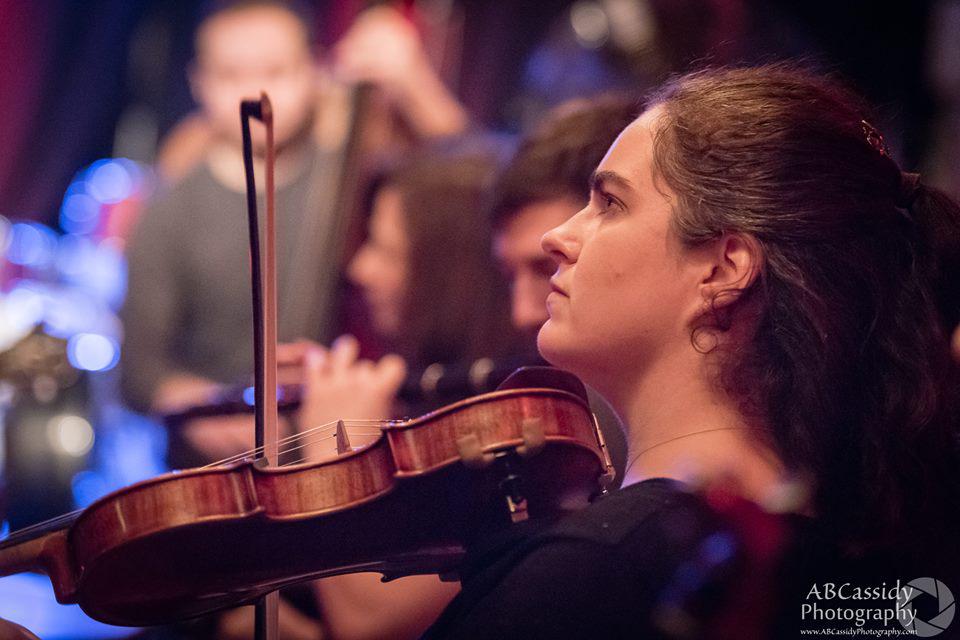Photo above – Session during Celtic Connections in Glasgow
Taking time to play fiddle tunes
I became a resident of Glasgow recently, after spending several months travelling and playing fiddle tunes. Until July last year, I had lived in Adelaide, South Australia and had chased as much musical learning and travelling as I could, while also studying and then working. I used to joke that if I won a lottery tomorrow, I would travel the world and play fiddle in as many places, with as many different people as I could. Then, a little more than a year ago, this crazy concept actually started to look possible!
These days, people ask me a lot about the traditional music scene in Australia and what it is like to grow up there. The best answer that I can give is that it is small, but full of extremely passionate people. There is a folk community spread across a vast country, but thanks to the calendar of festivals, it feels like a family that is a lot closer than it actually is geographically. Festival gigs are my favourite to play, as I always feel recharged by meeting and collaborating with musical friends, both old and new. Putting lots of artists in the same place is always a good idea!
I became obsessed with the sound of violins at about two years old and was allowed to start lessons a year or so later, when it became apparent to my parents that my fascination was not diminishing. I took classical violin lessons and later, viola lessons too. Growing up in the 90s, we got all of the Irish tunes that followed in the wake of Riverdance and I learnt every fiddle line that I could find. My mum bought me a few fiddle tune books (what a champion!), so I had memorised a few Irish standards when my parents (finally) took me to my first folk festival, aged 11. It changed my life! Folk were so encouraging – even though I hate to think how I would have sounded at that stage. I also met my first fiddle teacher there, Linda Rankin. She agreed to teach me Scottish fiddle, as that was her background. I was so excited to meet a real fiddle player and loved her music, so I was keen! The advice I received at that time was that classical music is the best way to learn good technique, so at that point, as well as my weekly classical lessons, I started taking monthly fiddle lessons.
Shortly after I found Linda, she started the Adelaide Scottish Fiddle Club, which became my door into the folk community. I met lots of folk who pointed me in the direction of local Irish sessions, Scottish recordings that I should have heard already and general fiddle repertoire that I should search out. Now, I realise that I was absorbing a fair bit of Scottish culture and history along the way too (when I thought I was only learning the music). I think this is one of the reasons why being in Scotland feels so unexpectedly comfortable now. In hindsight, I am also incredibly grateful to have grown up in the same city as Linda Rankin and Catherine Fraser, attending their workshops and gigs, buying their albums and learning their tunes. We talk about geography a lot because it relates to tradition, but when there are so few fiddlers between places, as is the case in Australia, growing up anywhere else really would have made me a totally different musician.
When there are few traditional musicians nearby, I think there are two ways to handle it. You could take the view that you will specialise in your chosen tradition, to the exclusion of all other styles, or try to do a bit of everything, because the best you will be doing is borrowing culture. As a teenager, I would have said that my heart was torn between both the symphony orchestra and traditional Scottish repertoire. The older I get though, the more I think I am still that obsessed toddler and that the best music involves great musicians playing the violin! During university, I had a startling reality check, where I realised that even though I could read music well (thanks to my classical lessons) and play by ear well (thanks to my fiddle experience), I could not improvise. At the same time, I was being asked to learn bluegrass, so I took that on and learnt to improvise and later, as a result, was approached to learn enough old time fiddle to teach it (there were no old time fiddlers in town at the time).
There are some really good Australian Celtic tunes, but there is a very distinct difference between those written in the last few decades and the more “traditional” repertoire. I have always loved learning tunes written by my friends, but have only started looking into older Australian repertoire in the last couple of years. So mostly, I do the best I can to lose my musical accent, as I learn any other style and try to honour whatever it is I am playing, in the best way that I know how to.
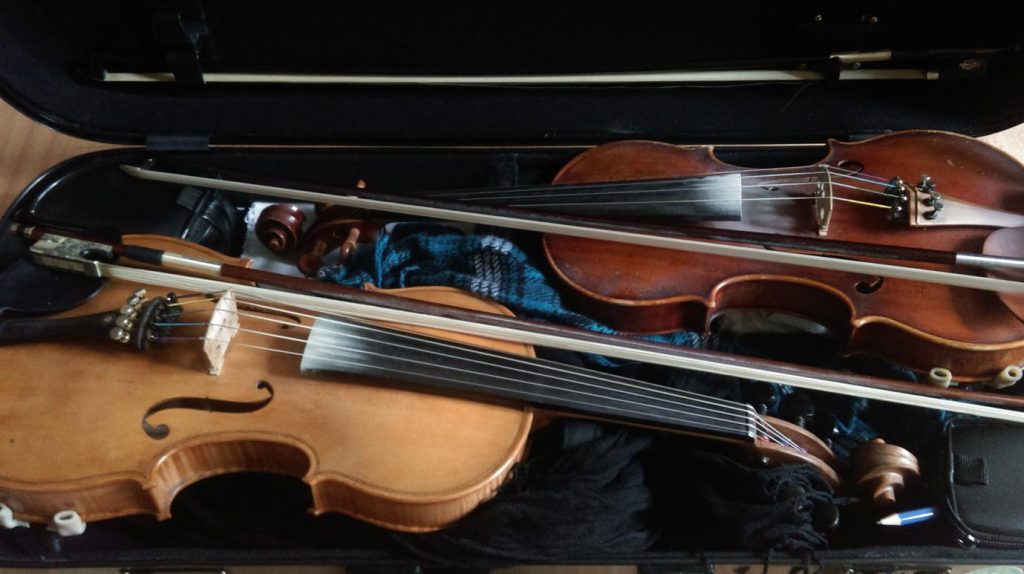
The best travelling companions anyone could ask for: a 5-string fiddle made by Gage Stead and a factory fiddle that was setup and put in my hands by Hugh Gordon, both local to Adelaide.
My existing knowledge of multiple fiddle styles became the map for my travels, which started in July last year. I started my trip playing Australian tunes at the Kaustinen Folk Festival in Finland, which I have wanted to attend for years and I also managed to learn a few more Finnish and Swedish tunes while I was there. Then I came to the UK, landing in London (as many Australians do) and found a few Irish sessions. I came North via some English folk music in Sheffield and Manchester and was in Edinburgh for a month, feeling privileged to be among the Shetland fiddlers in the Royal Edinburgh Military Tattoo. There were many times in Edinburgh where I found myself wondering how and why I was there – having watched the broadcast for so many years in Australia (as a way of taking in any Scottish culture I could). It was an incredible experience. I was even sent to Holyrood Palace to play for and meet royalty! I found some great sessions in Edinburgh and then some more in Glasgow, before heading to Dublin on my way to the USA.
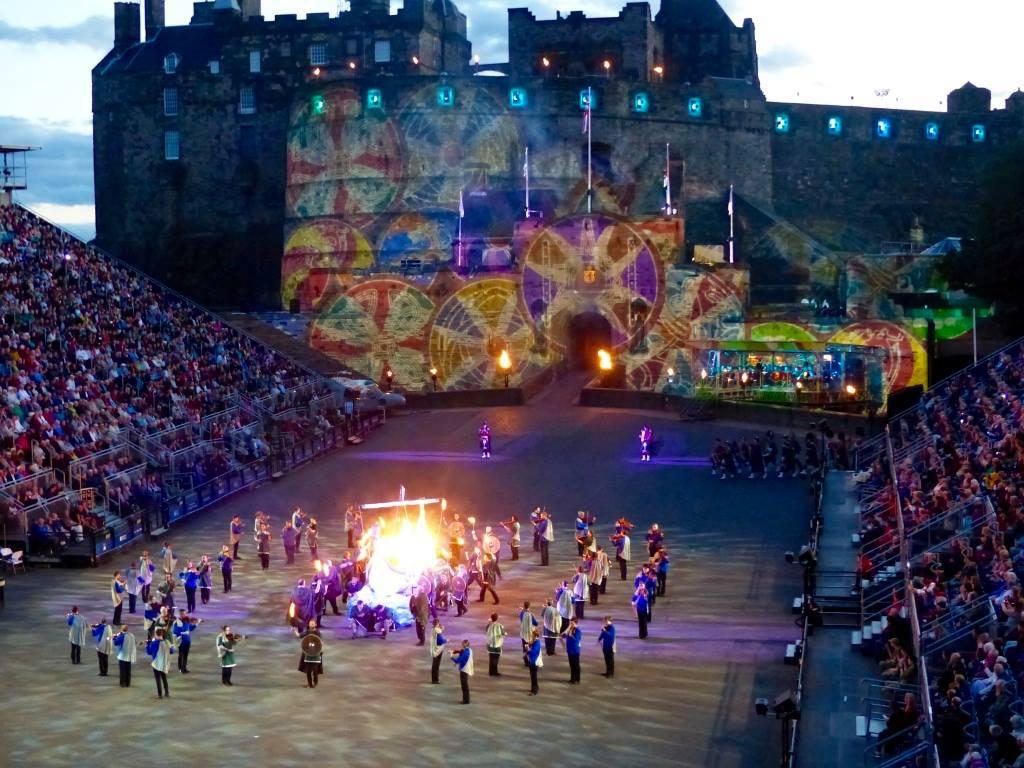
Hjaltibonhoga act at the 2017 Royal Edinburgh Military Tattoo
In Nashville Tennessee, I knew there were some friends’ gigs worth seeing, which was what I was aiming to do, but I also got a last minute call to join a “Nashville band” for a country singer at the Americana Music Festival. I still cannot believe how many incredible gigs I saw in Nashville and also, how nice everyone was! I then hired a car and drove through Asheville (looking for old time music, but finding blues, bluegrass and Irish tunes) on my way to Raleigh for the IBMA (International Bluegrass Music Association, or, I’ve Been Mostly Awake) World of Bluegrass. This was yet another week where I could not stop smiling! I got to play with some incredible pickers, who were all really nice about letting me join in and I watched many of my bluegrass idols play a lot of notes, mind-blowingly well. After the IBMA week, I zig-zagged across North Carolina a bit, heading through Durham, meeting more musicians and playing as much as I could.
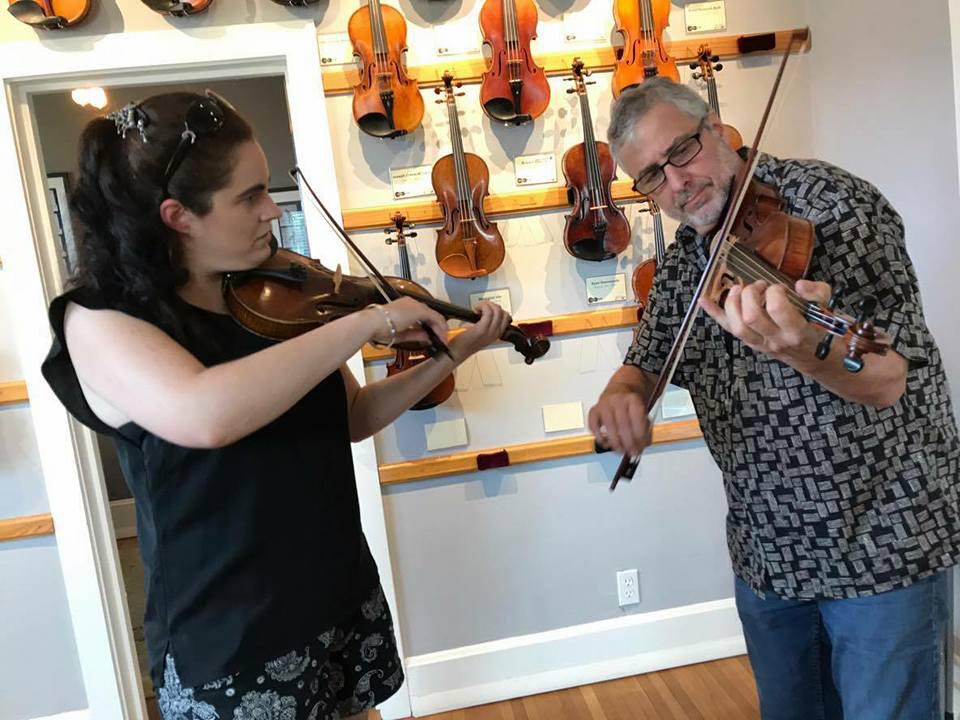
Jamming on some beautiful instruments at the Violin Shop in Nashville.
I headed North into Virginia and drove a bit around that state too, mostly being a music tourist (I took a series of selfies with signs that are bluegrass and old time tune titles, which I’m too embarrassed to share with anyone). I got to sit in on a gig with an old time band at the Floyd Country Store (I still can’t believe the circumstances that lead to that) and also, with a stunning duo from Nashville, that I’d met in North Carolina. I had a fantastic time in Baltimore and Philadelphia, staying with excellent people and loving the house jams and local pub sessions that they were able to take me to. In New York City, I had the craziest and best time finding old time, Irish and Scottish sessions with excellent people and soaking in the unique atmosphere of that city, before heading up to Boston, where I met and played with many excellent musicians and got to stay in a house featuring the most impressive library of Scottish tune books that I’ve ever seen!
I flew into “the other Sydney” (a hilarious conversation among the passengers on the tiny plane up) in Nova Scotia and spent some time chasing all of the Cape Breton fiddle gigs, sessions and square dances that I could find. One particular session brought me to tears when they chose to do a particularly poignant Eric Bogle song, upon finding out that I come from Australia. I drove to Halifax and then got a train through to Quebec, where I had an awesome week in Montreal (I don’t know when I’m going back, but I’m already looking forward to it!). Mostly, I was trying to find Quebecois gigs and sessions (which I did), but I was welcomed into bluegrass, country, old time and Irish sessions too, which was lovely. I followed that up with a few days in Toronto, staying in a house of awesome people, playing Irish and Old Time tunes and getting to guest in a couple of bluegrass gigs.
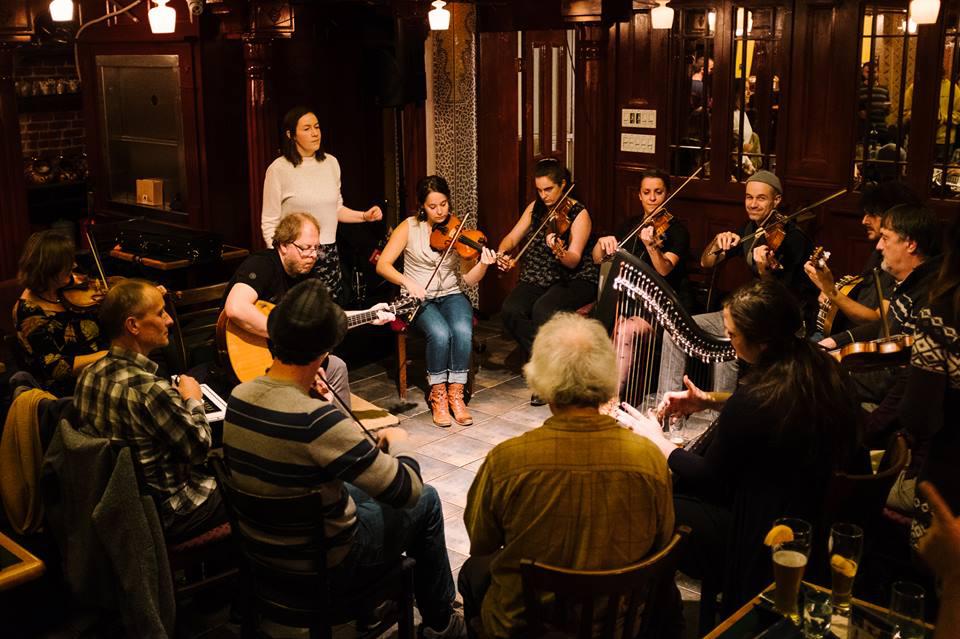
LaboTrad post-concert session in Montreal
I flew back to Scotland for the Scots Fiddle Festival, which meant that I got to see some excellent shows and catch up with fiddle friends, before heading to the incredibly fun Trip to Birmingham TradFest, via sessions in Glasgow and Newcastle (please don’t think too hard about that geography – Australians don’t mind spending time in a car). Then, I headed back to London, for a crazy week that featured old time, jazz and Irish music, before flying to Germany. I got to see the Berlin Philharmonic and the Deutsche Oper in action and (somehow) managed to catch a concert in the Elbphilharmonie in Hamburg. I found several Irish sessions during my time in Germany and was really interested by how many Irish tunes came up, that I hadn’t heard or played since leaving Australia.
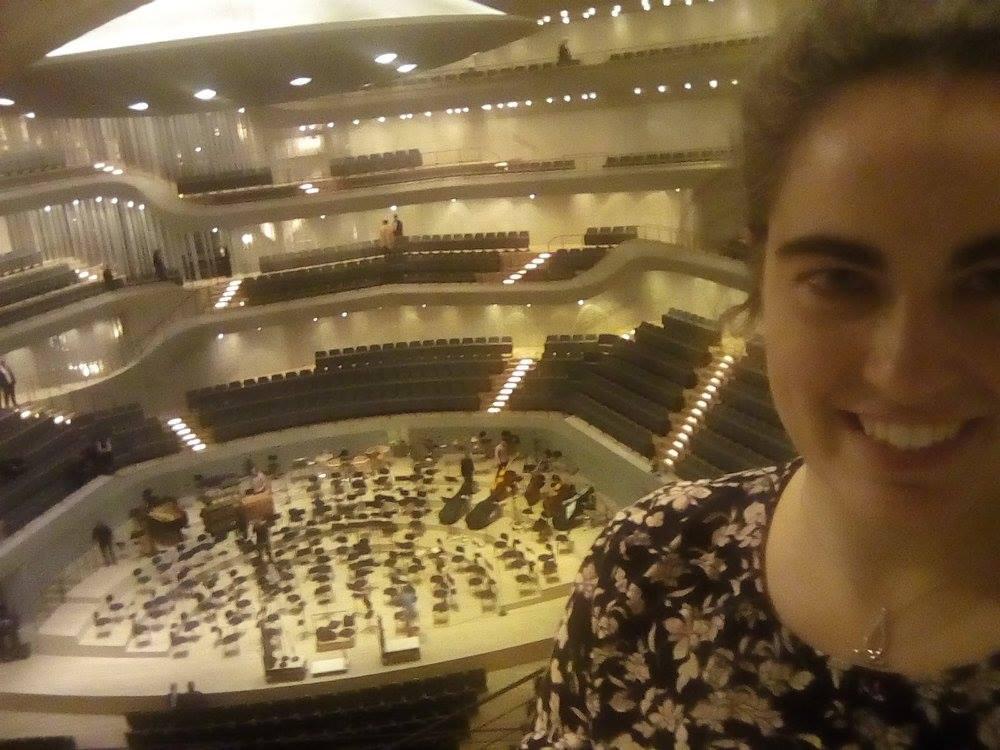
INCREDIBLE concert and acoustics at the Elbphilharmonie in Hamburg
I returned to Scotland for Christmas and spent time with fiddle players in Fife and Edinburgh, before heading to Glasgow as the city warmed up for Celtic Connections. Of course, it well and truly lived up to the hype and it was incredible to be attending concerts in venues that I’ve been seeing in photographs for years. I was lucky to pick up some last-minute gigs which definitely helped to fund my festival experience!
The original plan had been to stop travelling and go wherever I could find a job after Celtic Connections, but I have continued to bounce around playing fiddle, for much longer than I planned to. I have been to Paris to play Irish tunes and to Norway, to perform some of the Edinburgh Tattoo repertoire. I have found some bluegrass music in England, which has been fun every time and been lucky enough to have time with very cool musicians in London, Bristol and Bath. People in Scotland have been amazing, passing me ceilidh and session work (which is the only reason I have not yet starved). I absolutely adore Glasgow for many reasons, but especially the vibrant music scene. There is an excitement surrounding music making here, which is nearly unique – the closet comparison in my experience so far, is Nashville, although clearly, much of the music that is made requires different skills.
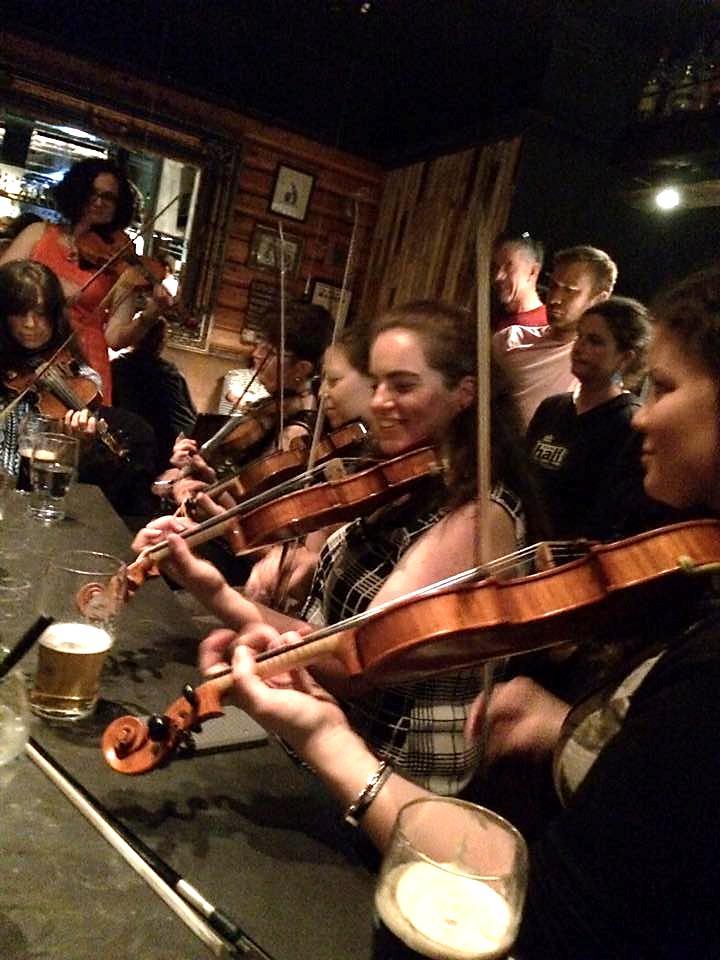
Session in Edinburgh in August
There are many music teachers who love to say that music is the only international language. In the sense that it brings people together and can transcend words, this is absolutely true. Now I think about this concept quite differently, though. When I started my travels, I wished that I had grown up completely within a fiddle tradition, where I could talk with people about the music I was drawn to. When I left Australia, I thought that I had to learn lots, in order to make up for the time that I lost while I was struggling to access fiddle music. However, now I am more grateful than ever to have grown up where I did. On this mission, I have become more appreciative of the way in which I tried to learn whichever “fiddle languages” I could access, because it has literally opened up a whole world for me! Knowing multiple fiddle styles has put me in so many awesome situations, with more amazing musicians than I ever could have dreamed of meeting and I am so glad that there have been lots of circumstances where I could fit in because of my “fiddle language” at least, if not in other ways. I have also been thinking about how much more I seem to learn about the music that I already know intimately, by learning to define the differences between that and music that I am still trying to understand. I could easily have made this a tune gathering mission, but have been trying instead to make it about speeding up my own learning process. I have also been asking questions wherever I can, to try and find out as many different perspectives about music as possible.
I recorded an album just before I left Australia and even though I still enjoy playing those tunes, to my ear, I play them completely differently now. This is a conundrum for me. If I thought those Australian tunes should sound that way in Australia, but now I think they should sound another way outside of Australia, are they more or less “my” sound now that I’m on the outside looking back?
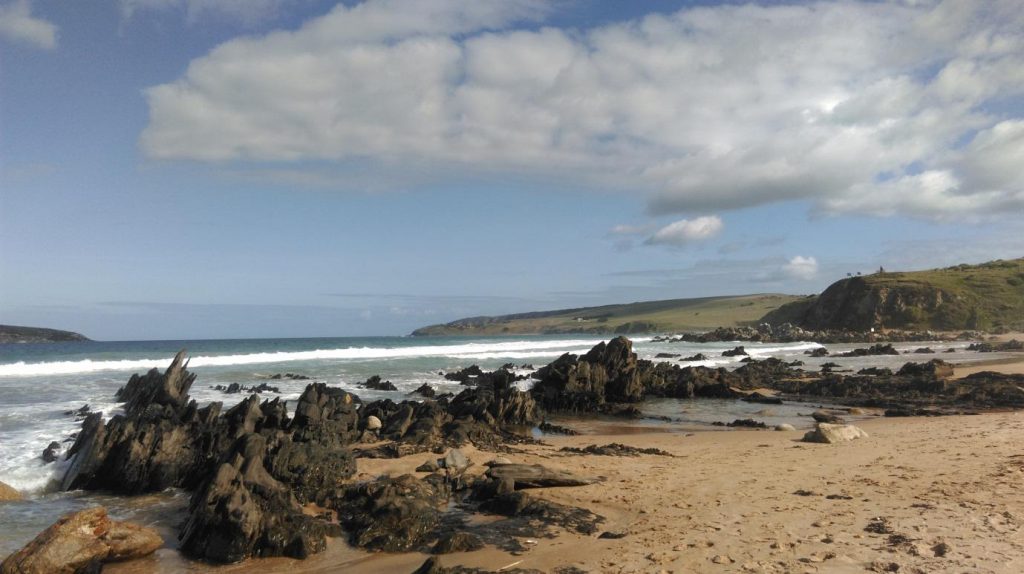
The stunning location where the album cover photos were taken, near where my mum lives in South Australia.
I think about how much migration has defined Australian culture and how much the travel within Australia was a part of my life in Adelaide. I really, really hope that I continue to get to explore new parts of the world with my fiddle! When I left Australia, I was worried that finding fiddle tunes full-time might be too much and that I might get bored with doing mostly one thing however, I find myself falling more in love with traditional music every day. If I won the lottery tomorrow, I’d continue to travel the world and play fiddle in as many places, with as many different people, as possible.


